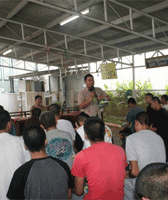Ajeng Larasati
2010 Asia JusticeMakers Fellow, Indonesia

About Ajeng Larasati
Ajeng Larasati lives by the credo that human rights inherently belong to every human being. Through Larasati work with LBH Masyarakat, a community legal aid organization, she has witnessed how often the criminal justice system completely ignored this. Working as a legal advisor, Larasati works primarily with drug addicts and other offenders throughout Jakarta and through her daily counseling sessions, taught basic legal rights of the accused, right to counsel and the right to be free from torture. However, she quickly noticed a debilitating lack of motivation. She listened to accounts of the severe abuse and discrimination experienced by members of this community, and the stigma law enforcement and the judicial sector far too regularly associate with them. They considered themselves marginalized in society, without access to the basic human rights formally enshrined in Indonesian law.
Locating the Problem
Although a lot of her work was with drug users, Ajeng realized this terrible phenomenon was not specific to drug users, but rather common to the poor throughout Indonesia. During her tenure as a legal advisor, she also coordinated the summer internship program at LBH Masyarakat, which enlisted the support of over 22 interns from around the world. She organized activities ranging from discussions with government institutions and NGOs, internal educational sessions, community legal empowerment events and case advocacy. This foray into the inner workings of LBH Masyarakat woke her up to the greater challenges facing the indigent accused and the legal aid sector in Indonesia. She witnessed firsthand the disparity in legal access and education between the classes of society.
Ajeng further cemented her passion for legal advocacy through her representation of LBH Masyarakat at the Indonesian Coalition Against Torture (JAPI) and the Lapindo Mudflow Coalition. At these events she participated in round-table discussions, rallies and panels, broadening her perspective on the distinct approaches available to address legal challenges confronting the accused.
Innovation
The Indonesian Criminal Procedural Code clearly outlines the basic legal rights of all citizens, including the right to be informed of the charges faced and the right to defense counsel. However, the majority of the accused and detained remain unaware of these rights, and are thus unable to exercise them. While law enforcement and prosecutors are obliged to appoint lawyers for the indigent facing a potential sentence of over five years, this law is poorly implemented with little follow-through. Furthermore, police are not required to supply information regarding the facts of their case. General lack of awareness of legal rights and a legal aid system lacking in institutional support has both obstructed access to justice for the accused and facilitated the spread of torture and other violations of fundamental human rights.
Ajeng seeks to ensure that detainees exercise the right to legal counsel extended to them by Indonesia’s constitution. By establishing a partnership with a major detention centre in Jakarta, she will conduct a needs assessment to evaluate the actual condition of the accused, the legal problems they face, and the likelihood of successfully defending their cases. Accordingly, she will design educational tools to carry out a regular series of legal training and human rights educational sessions, and enlist a team of lawyers, law professors, paralegals and law students to conduct these events. While it is critical to inform the detainees of their rights, Ajeng also believes it is essential to motivate them to exercise these protections. Thus she has recruited psychologists to complement the panel of legal stakeholders during the sessions. She will also institutionalize legal advising skills by training a select group of convicted detainees to continue the educational sessions and assist the prison warden in providing legal services.
Progress
Part of Ajeng’s project revolved around training paralegal advocates (convicted prisoners who hold jobs in the prison offices), on the Indonesian Criminal Procedure Code and legal rights guaranteed to detainees. During the course of the fellowship Ajeng successfully completed training for five such paralegal advocates. She found that in the training, not only were the accused helped by having people in the prison who were knowledgeable on rights and more easily accessible, but the paralegal advocates themselves benefited from the training’s. The psychological effects of being incarcerated are numerous. Through this program their confidence increased significantly and in the end they reported that they felt more useful and began to seek out other leadership roles. All of them stated that if other prisoners asked them a question they not only felt comfortable in trying to answer them but also comfortable in directing those inquiries to the correct prison staff or lawyers from Ajeng’s NGO. Other accomplishments throughout Ajeng projects included making brochures that detailed legal rights, which were a principle tool in many of the training’s she conducted.
Post fellowship
Post fellowship, Ajeng has many plans. She hopes that legal counseling and consultation will still be available as this is a major asset to prisoners and has allowed many accused access to information regarding their rights and the trial process. She also hopes to expand her project to include two more detention centers, one exclusively for women and children. Above all, Ajeng plans to continue empowering the community through her work and making more resources available to all in need.